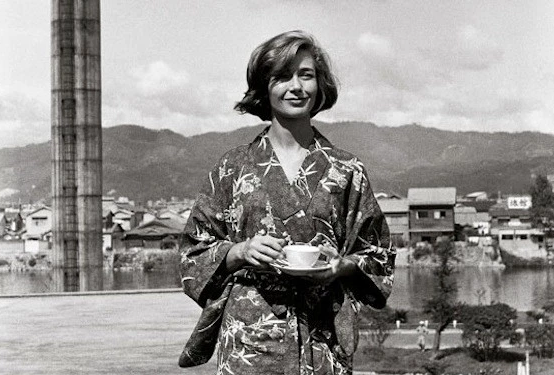Perhaps no other actress–apart from Audrey Hepburn in Roman Holiday–hit the jackpot as much as Emmanuelle Riva with her debut role as Elle in Hiroshima, Mon Amour. As part of the trailblazing movement that would become known as Left Bank Cinema (the less financially successful facet of the French New Wave; Right Bank Cinema was where the so-called money was for the likes of Godard and Truffaut), the film focuses on conversations between Elle (Riva) and Lui (Eiji Okada) over a period of thirty-six hours.
In many ways, the iconic movie would go on to influence Richard Linklater’s Before Sunrise trilogy as it was the first time in cinema history when so much emphasis was placed solely on dialogue between two people, especially dialogue that frankly addressed the demise of a tryst. Flashbacks and memories establish Elle’s arrival to Hiroshima after the atrocious August 6, 1945 bombing. Her romantic dalliance with Lui begins with an entanglement of two bodies (racy for the time, you know) and the signature use of director Alain Resnais’ repetition of dialogue by Marguerite Duras, as Lui insists, “You saw nothing in Hiroshima.”
But oh, the things she saw, and experienced–particularly at that museum she went to four times, the one showcasing the wreckage and aftermath of the atomic bomb. Indeed, this, too, is the metaphor wielded for relationships in Hiroshima, Mon Amour. No one gets out unscathed or even alive–at least not half as alive as they felt before. The use of memory and its distortion for survival purposes plays another integral role in the film. As Elle so accurately puts it, “Just as in love, there is this illusion, this illusion that you will never be able to forget, the way I had the illusion, faced with Hiroshima, that I would never forget. Just as in love.”
Forgetting and/or suppressing is the only way to survive any trauma–and what trauma is greater than love lost? For Emmanuelle Riva to step into a role so powerful and poignant at the outset of her filmography immediately established her as one of the greats of French cinema.
Though Riva’s career would go on to thrive and continue to show her acting ability (especially with the 2012 coup, Amour, for which she became the oldest actress to be nominated for an Academy Award), it was always this first film, the first time we fell in love with Riva, that one thinks of when she comes to mind. Her death on January 27th from cancer conjures the image of her saying as Elle, “Why deny the obvious necessity for memory?” And in that necessity, film enthusiasts and victims of love everywhere could never forget Riva.






















